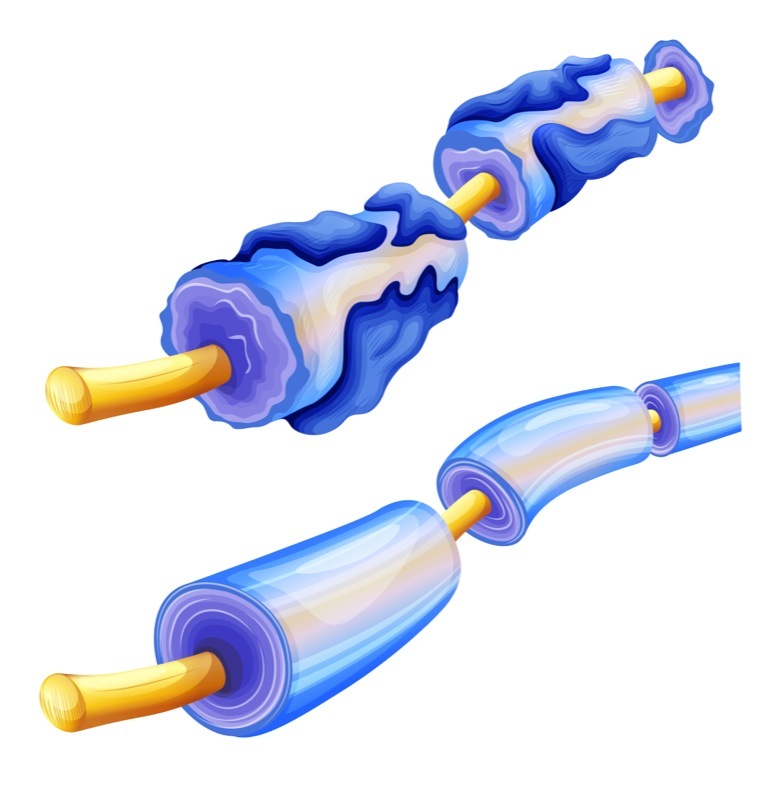New HDAC6 Inhibitor Shows Myelination Potential in CMT1A Models
Written by |

CKD-504, a new compound that works to block the protein HDAC6, was found to restore myelination in cell and mouse models of Charcot-Marie-Tooth disease type 1A (CMT1A) in an early study.
Results indicate that CKD-504 – and, more broadly, the strategy of inhibiting HDAC6 – might be effective for the treatment of CMT1A.
The study, “A novel HDAC6 inhibitor improves myelination of Schwann cells in a model of Charcot‐Marie‐Tooth disease type 1A,” was published in the British Journal of Pharmacology.
CMT1A accounts for about half of all cases of CMT. It is caused by abnormally high levels of the protein PMP22 as a result of a genetic duplication, which ultimately results in demyelination (loss of myelin) of nerves in the peripheral nervous system.
Myelin is a fatty substance that surrounds nerve cells like a sheath, which is important for these cells to efficiently transmit electrical signals. Restoring lost myelin is regarded as a promising treatment strategy in CMT1A and other types of CMT.
Histone deacetylase 6 (HDAC6) is a protein that acts by removing acetyl groups from other proteins, a type of chemical modification that helps to regulate a variety of functions within cells. HDAC6, in particular, has been shown to be involved in regulating myelination (the formation of myelin).
Specifically, HDAC6 activity is thought to limit myelination; as such, inhibiting HDAC6 may promote myelination by “removing the brakes” from this process.
Indeed, HDAC6 inhibition has demonstrated therapeutic potential in preclinical models of CMT type 2. Its use has not been specifically investigated in the context of CMT1A.
CKD-504 is aHDAC6 inhibitor developed by Chong Kun Dang Pharmaceutical Corporation (CKD), which also supported this study. Here, researchers from CKD and other institutes in Korea investigated the new HDAC6 inhibitor in preclinical models of CMT1A.
First, they performed molecular assays demonstrating that CKD-504 powerfully blocked the activity of HDAC6, but not that of other, related proteins.
“These results confirm that CKD-504 is a potent and selective HDAC6 inhibitor,” the researchers wrote.
Next, the compound was tested on Schwann cells — the cells primarily responsible for producing myelin in the peripheral nervous system. To do this, a previously established method was used, in which Schwann cells were produced from human stem cells collected during tonsillectomy (surgical removal of the tonsils).
As the CMT1A model, the researchers used cells derived from people with CMT1A, which carry the same disease-causing mutations as the people from whom they are derived. For comparison, the research team also assessed cells derived from people without CMT.
Treatment with CKD-504 lowered PMP22 levels by about 86% in CMT1A Schwann cells, potentially by promoting protein degradation within cells. It also increased myelination by more than four times.
CKD-504 was then investigated in C22 mice, a mouse model of CMT1A. One group of these mice was given CKD-504 orally twice a day for three weeks; another, acting as a control group, was given water.
Compared to the controls, mice treated with CKD-504 performed significantly better on assessments of motor function, including balance and grip strength. Treatment also significantly increased myelination, though levels were still markedly lower than those seen in mice without CMT.
Furthermore, CKD-504’s use improved the efficiency with which the mice’s nerves sent electrical signals, and it lessened the buildup of PMP22 in nerve cells.
“CKD-504 reduced the amount of PMP22 protein in the sciatic nerves of C22 mice. As a result, CKD-504 restored myelination of the sciatic nerve and improved the electrophysiological parameters and motor functions of C22 mice,” the researchers concluded.
“Taken together,” they added, “these results suggest that this novel HDAC6 inhibitor, CKD-504, could become a new therapeutic option for CMT1A patients.”
Further analyses provided some clues as to the exact mechanism of this effect. Specifically, the findings showed that CKD-504 treatment altered proteins that are involved in regulating how other proteins within the cell fold. Generally, proteins must be in a particular three-dimensional shape in order to function properly, so protein folding is tightly regulated within cells.
“The observations in this study strongly suggest that CKD-504-mediated PMP22 reduction is due to the last mechanism involved in protein folding/refolding, but that hypothesis should be tested in another study,” the researchers wrote.
An ongoing Phase 1 trial (NCT03713892) is recruiting healthy adults to study the safety and tolerability of CKD-504. The treatment is being tested in single and multiple ascending doses in Koreans and Caucasians enrolled at a single site in Seoul.





